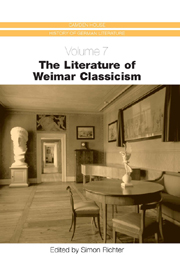Book contents
- Frontmatter
- Contents
- List of Illustrations
- Preface and Acknowledgments
- Conventions, Editions, and Abbreviations
- Introduction
- What is Classicism?
- Antiquity and Weimar Classicism
- The Correspondents' Noncorrespondence: Goethe, Schiller and the Briefwechsel
- Johann Gottfried Herder: The Weimar Classic Back of the (City)Church
- Drama and Theatrical Practice in Weimar Classicism
- German Classical Poetry
- The Novel in Weimar Classicism: Symbolic Form and Symbolic Pregnance
- German Women Writers and Classicism
- Weimar Classicism as Visual Culture
- The Irrelevance of Aesthetics and the De-Theorizing of the Self in “Classical” Weimar
- Goethe's “Classical” Science
- The Political Context of Weimar Classicism
- Bibliography
- Notes on the Contributors
- Index
German Women Writers and Classicism
Published online by Cambridge University Press: 05 February 2013
- Frontmatter
- Contents
- List of Illustrations
- Preface and Acknowledgments
- Conventions, Editions, and Abbreviations
- Introduction
- What is Classicism?
- Antiquity and Weimar Classicism
- The Correspondents' Noncorrespondence: Goethe, Schiller and the Briefwechsel
- Johann Gottfried Herder: The Weimar Classic Back of the (City)Church
- Drama and Theatrical Practice in Weimar Classicism
- German Classical Poetry
- The Novel in Weimar Classicism: Symbolic Form and Symbolic Pregnance
- German Women Writers and Classicism
- Weimar Classicism as Visual Culture
- The Irrelevance of Aesthetics and the De-Theorizing of the Self in “Classical” Weimar
- Goethe's “Classical” Science
- The Political Context of Weimar Classicism
- Bibliography
- Notes on the Contributors
- Index
Summary
The classification of texts by women writers of the late eighteenth and early nineteenth centuries is notoriously difficult. Often considered trivial, the works of women writers of this period have remained below the radar screen of many literary histories. Efforts to remedy the omission and add these stray texts to the existing canon are often thwarted by the nature of the works themselves and by the precarious situation of their female authors. Female authorship constituted a transgression against contemporary gender norms. Consequently, women writers strove to downplay or hide their literary activities. They did not formulate literary programs, rarely shared their aesthetic reflection explicitly, and, for the most part, did not belong to established literary groups. Many shrank from defining themselves as writers. The uneven nature of their works also defies easy categorization. Attempts to pinpoint aesthetic and ideological affinities are complicated by the fact that many of these works were conceived not in emulation of, but in conscious or unconscious deviation from male models. Many women writers found themselves poised between admiration for the literary and philosophical achievements of their male contemporaries — evidenced by the frequency with which women writers quoted Goethe, Schiller, and other writers — and repulsion at the misogyny of their gender politics.
- Type
- Chapter
- Information
- The Literature of Weimar Classicism , pp. 237 - 264Publisher: Boydell & BrewerPrint publication year: 2005



